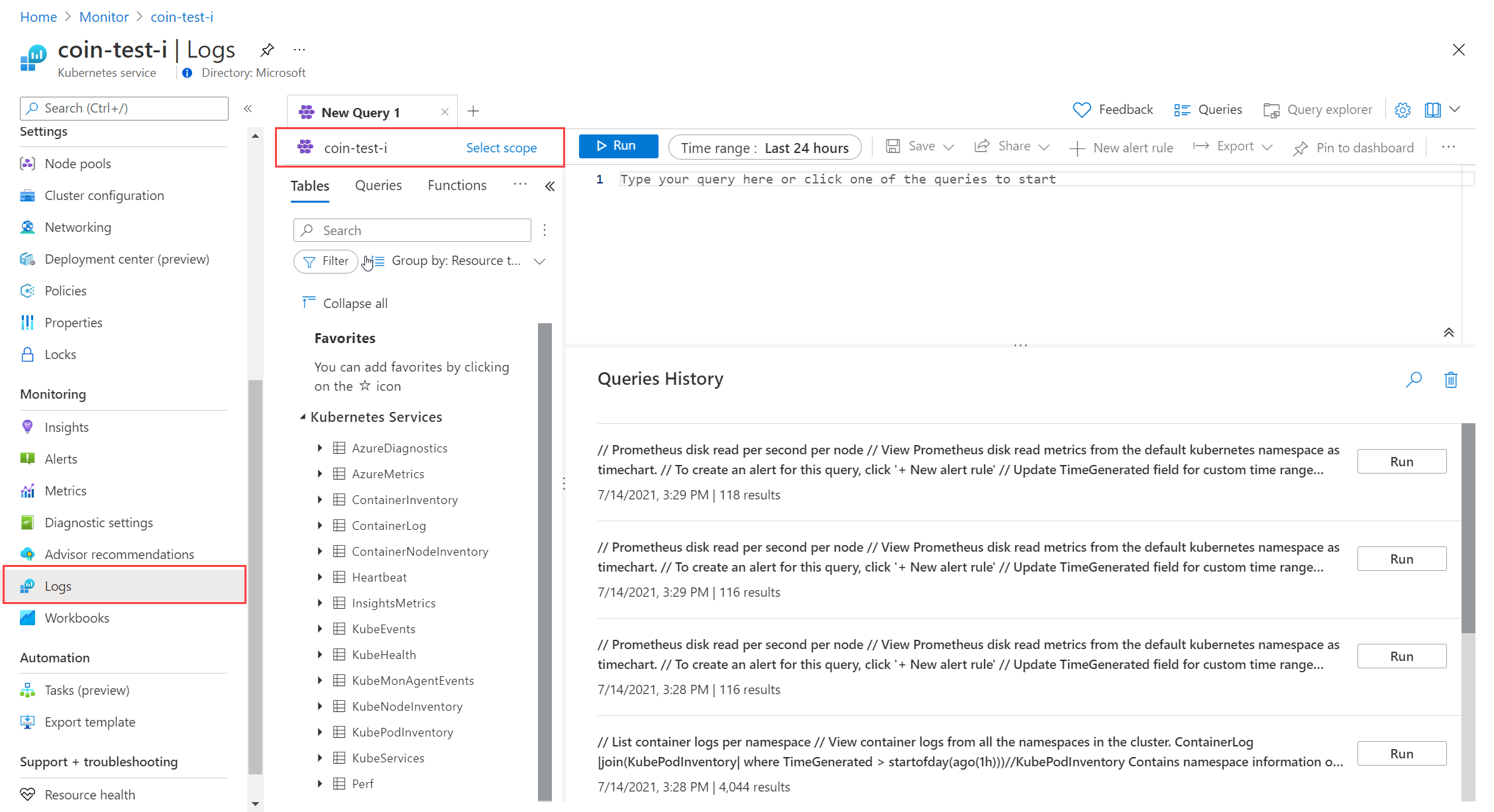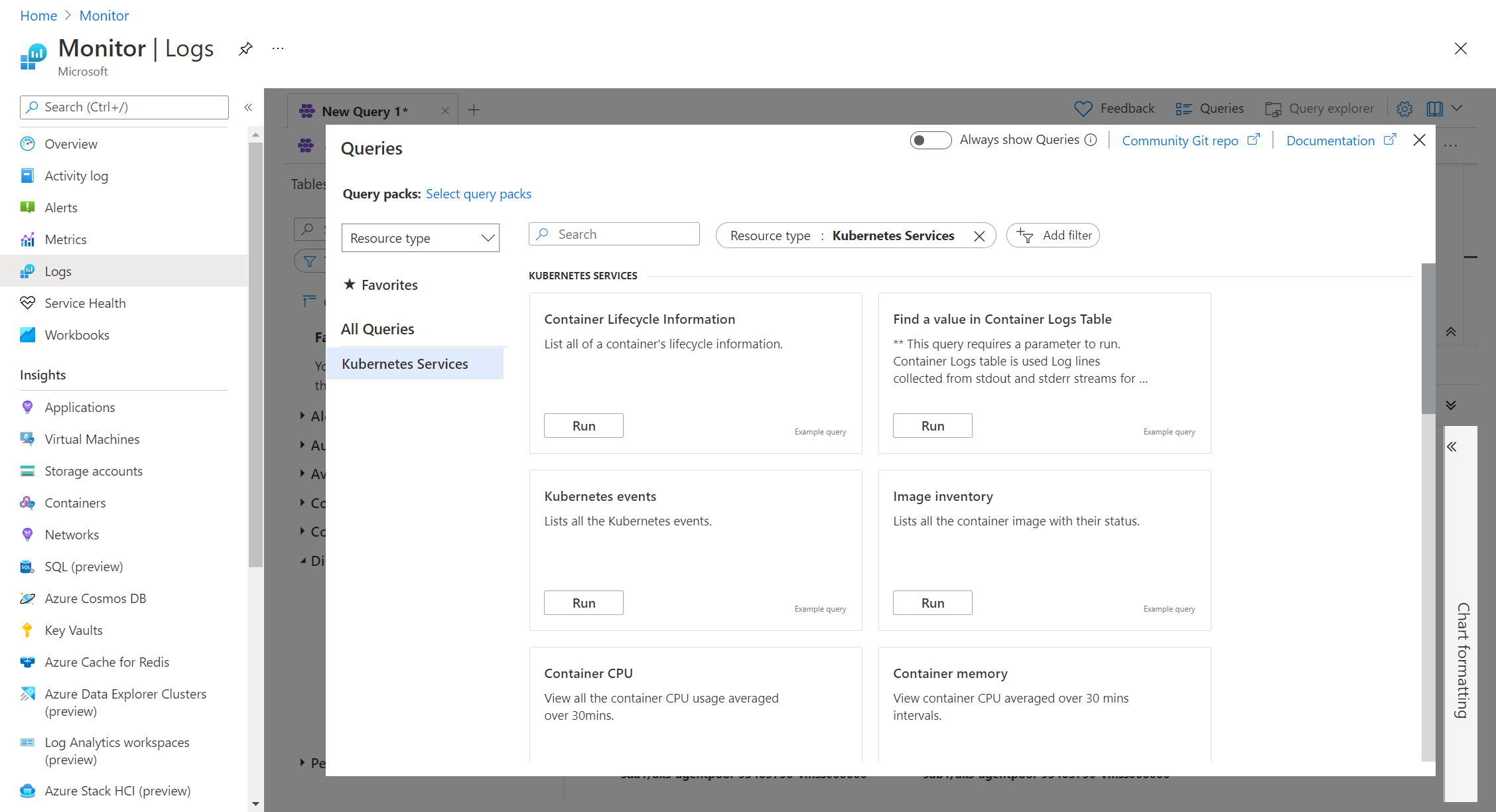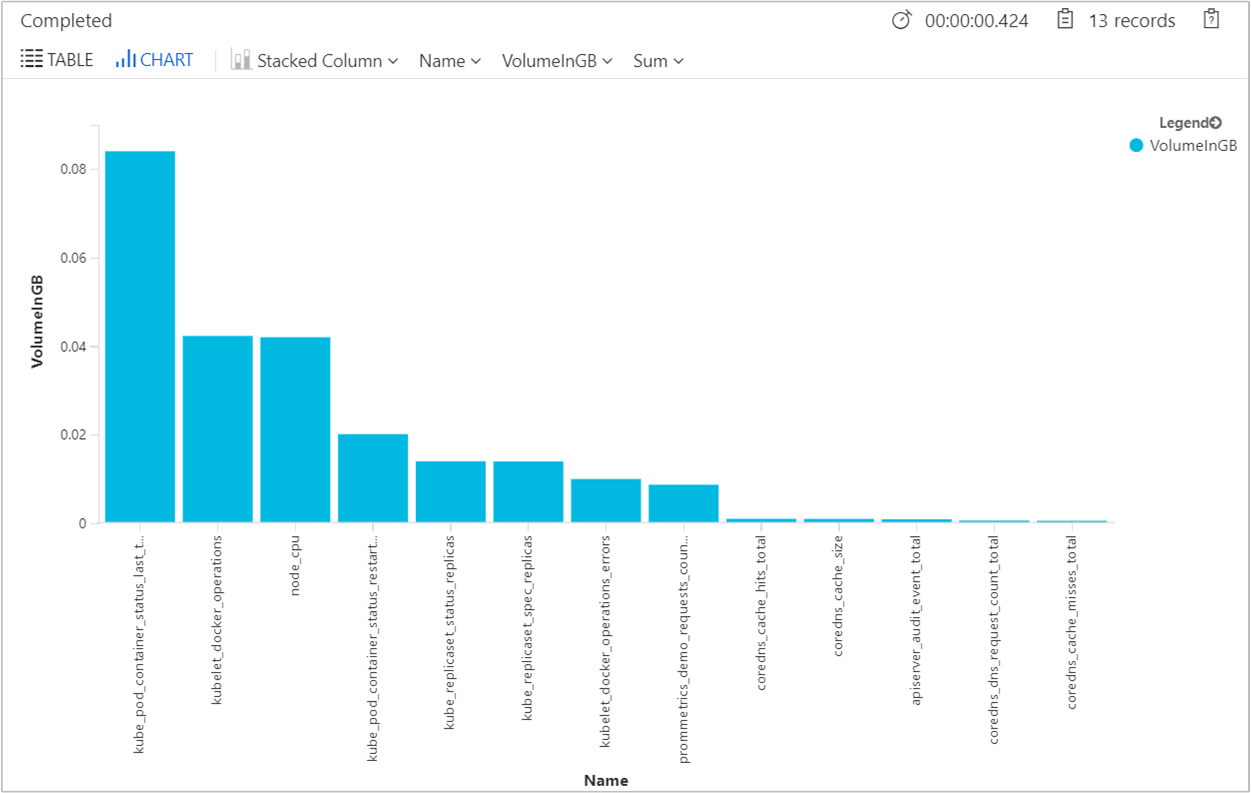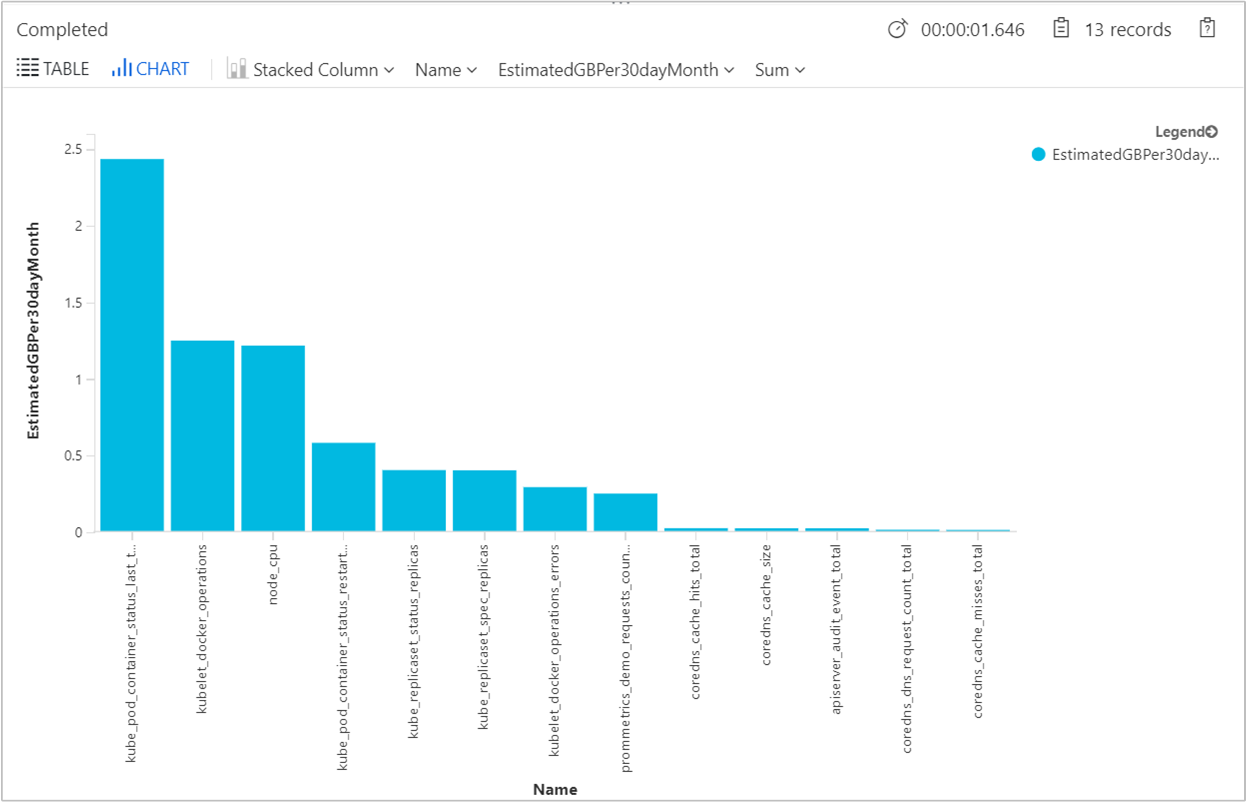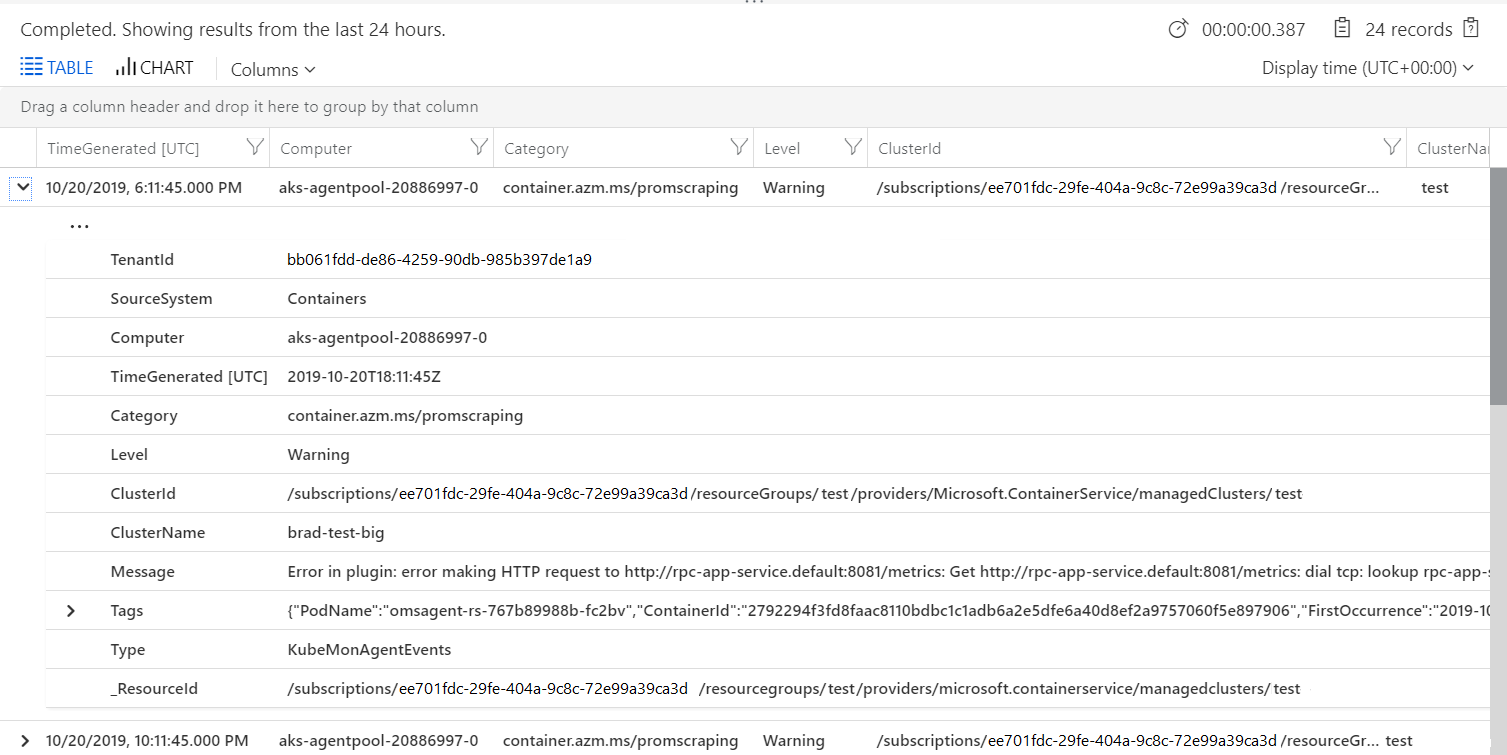Abfrageprotokolle aus Container Insights
Container Insights erfasst Leistungsmetriken, Inventurdaten und Informationen zum Integritätszustand von Containerhosts und Containern. Die Daten werden alle drei Minuten gesammelt und an den Log Analytics-Arbeitsbereich in Azure Monitor weitergeleitet. Dort werden sie für Protokoll-Abfragen mithilfe von Log Analytics in Azure Monitor zur Verfügung stehen.
Diese Daten können in verschiedenen Szenarios von Nutzen sein, z.B. bei der Migrationsplanung, Kapazitätsanalyse, Ermittlung und Ad-hoc-Behebung von Leistungsproblemen. Mit Azure Monitor-Protokollen können Sie nach Trends suchen, Engpässe diagnostizieren, Prognosen erstellen oder Daten korrelieren, die Ihnen die Einschätzung ermöglichen, ob die aktuelle Clusterkonfiguration optimal funktioniert.
Informationen zur Verwendung dieser Abfragen finden Sie unter Verwenden von Abfragen in Azure Monitor Log Analytics. Ein vollständiges Tutorial zur Verwendung von Log Analytics zum Ausführen von Abfragen und zum Arbeiten mit ihren Ergebnissen finden Sie im Log Analytics-Tutorial.
Wichtig
Die Abfragen in diesem Artikel hängen von Daten ab, die von Containereinblicken gesammelt und in einem Log Analytics-Arbeitsbereich gespeichert sind. Wenn Sie die Standardeinstellungen für die Datensammlung geändert haben, geben die Abfragen möglicherweise nicht die erwarteten Ergebnisse zurück. Vor allem, wenn Sie die Sammlung von Leistungsdaten deaktiviert haben, da Sie Prometheus-Metriken für den Cluster aktiviert haben, geben alle Abfragen, welche die Perf-Tabelle verwenden, keine Ergebnisse zurück.
Siehe Konfigurieren der Datensammlung in Containereinblicken mithilfe der Datensammlungsregel für voreingestellte Konfigurationen, einschließlich der Deaktivierung der Leistungsdatensammlung. Weitere Datensammlungsoptionen finden Sie unter Konfigurieren der Datensammlung in Containereinblicken mithilfe von ConfigMap.
Öffnen von Log Analytics
Es gibt mehrere Möglichkeiten, Log Analytics zu starten. Jede Option beginnt mit einem anderen Bereich. Um auf alle Daten im Arbeitsbereich zuzugreifen, wählen Sie im Menü Überwachung die Option Protokolle aus. Um die Daten auf einen einzelnen Kubernetes-Cluster zu beschränken, wählen Sie Protokolle aus dem Menü dieses Clusters aus.
Vorhandene Protokollabfragen
Sie müssen nicht unbedingt verstehen, wie Sie eine Protokollabfrage schreiben, um Log Analytics zu verwenden. Sie können aus mehreren vordefinierten Abfragen auswählen. Sie können diese Abfragen entweder ohne Änderung ausführen oder als Start für Ihre eine benutzerdefinierte Abfragen verwenden. Wählen Sie Abfragen oben im Protokollanalysebildschirm und zeigen Sie die Abfragen mit dem Ressourcentyp von Kubernetes Services an.
Containertabellen
Eine Liste der Tabellen und deren ausführliche Beschreibungen, die von Container Insights verwendet werden, finden Sie in der Azure Monitor Tabellenreferenz. Alle diese Tabellen sind für die Protokollabfragen verfügbar.
Beispiele für Protokollabfragen
Es ist oft hilfreich, die Abfrageerstellung ausgehend von einem oder zwei Beispielen zu beginnen und diese dann den Anforderungen entsprechend anzupassen. Sie können mit den folgenden Beispielabfragen experimentieren, um komplexere Abfragen zu erstellen.
Liste mit Lebenszyklusinformationen aller Container
ContainerInventory
| project Computer, Name, Image, ImageTag, ContainerState, CreatedTime, StartedTime, FinishedTime
| render table
Kubernetes-Ereignisse
Hinweis
Normale Ereignistypen werden standardmäßig nicht gesammelt. Sie werden also nicht angezeigt, wenn Sie die Tabelle KubeEvents abfragen, es sei denn, die Einstellung collect_all_kube_events ist aktiviert. Wenn Sie normale Ereignisse sammeln müssen, aktivieren Sie die Einstellung collect_all_kube_events in container-azm-ms-agentconfig-ConfigMap. Weitere Informationen zur ConfigMap-Konfiguration finden Sie unter Konfigurieren der Agent-Datensammlung für Container Insights.
KubeEvents
| where not(isempty(Namespace))
| sort by TimeGenerated desc
| render table
Container-CPU
Perf
| where ObjectName == "K8SContainer" and CounterName == "cpuUsageNanoCores"
| summarize AvgCPUUsageNanoCores = avg(CounterValue) by bin(TimeGenerated, 30m), InstanceName
Containerspeicher
Diese Abfrage verwendet memoryRssBytes, was nur für Linux-Knoten verfügbar ist.
Perf
| where ObjectName == "K8SContainer" and CounterName == "memoryRssBytes"
| summarize AvgUsedRssMemoryBytes = avg(CounterValue) by bin(TimeGenerated, 30m), InstanceName
Anforderungen pro Minute mit benutzerdefinierten Metriken
InsightsMetrics
| where Name == "requests_count"
| summarize Val=any(Val) by TimeGenerated=bin(TimeGenerated, 1m)
| sort by TimeGenerated asc
| project RequestsPerMinute = Val - prev(Val), TimeGenerated
| render barchart
Pods nach Name und Namespace
let startTimestamp = ago(1h);
KubePodInventory
| where TimeGenerated > startTimestamp
| project ContainerID, PodName=Name, Namespace
| where PodName contains "name" and Namespace startswith "namespace"
| distinct ContainerID, PodName
| join
(
ContainerLog
| where TimeGenerated > startTimestamp
)
on ContainerID
// at this point before the next pipe, columns from both tables are available to be "projected". Due to both
// tables having a "Name" column, we assign an alias as PodName to one column which we actually want
| project TimeGenerated, PodName, LogEntry, LogEntrySource
| summarize by TimeGenerated, LogEntry
| order by TimeGenerated desc
Horizontale Pod-Skalierung (HPA)
Diese Abfrage gibt die Anzahl der hochskalierten Replikate in jeder Bereitstellung zurück. Sie berechnet den Prozentsatz für die horizontale Skalierung mit der maximalen Anzahl von Replikaten, die in der HPA konfiguriert sind.
let _minthreshold = 70; // minimum threshold goes here if you want to setup as an alert
let _maxthreshold = 90; // maximum threshold goes here if you want to setup as an alert
let startDateTime = ago(60m);
KubePodInventory
| where TimeGenerated >= startDateTime
| where Namespace !in('default', 'kube-system') // List of non system namespace filter goes here.
| extend labels = todynamic(PodLabel)
| extend deployment_hpa = reverse(substring(reverse(ControllerName), indexof(reverse(ControllerName), "-") + 1))
| distinct tostring(deployment_hpa)
| join kind=inner (InsightsMetrics
| where TimeGenerated > startDateTime
| where Name == 'kube_hpa_status_current_replicas'
| extend pTags = todynamic(Tags) //parse the tags for values
| extend ns = todynamic(pTags.k8sNamespace) //parse namespace value from tags
| extend deployment_hpa = todynamic(pTags.targetName) //parse HPA target name from tags
| extend max_reps = todynamic(pTags.spec_max_replicas) // Parse maximum replica settings from HPA deployment
| extend desired_reps = todynamic(pTags.status_desired_replicas) // Parse desired replica settings from HPA deployment
| summarize arg_max(TimeGenerated, *) by tostring(ns), tostring(deployment_hpa), Cluster=toupper(tostring(split(_ResourceId, '/')[8])), toint(desired_reps), toint(max_reps), scale_out_percentage=(desired_reps * 100 / max_reps)
//| where scale_out_percentage > _minthreshold and scale_out_percentage <= _maxthreshold
)
on deployment_hpa
Hochskalierungen für Knotenpools
Diese Abfrage gibt die Anzahl der aktiven Knoten in jedem Knotenpool zurück. Sie berechnet die Anzahl der verfügbaren aktiven Knoten und die maximale Knotenkonfiguration in den Einstellungen für die automatische Skalierung, um den Prozentsatz für die horizontale Skalierung zu bestimmen. Informationen für das Verwenden einer Warnregel für die Anzahl von Ergebnissen finden Sie in den kommentierten Zeilen der Abfrage.
let nodepoolMaxnodeCount = 10; // the maximum number of nodes in your auto scale setting goes here.
let _minthreshold = 20;
let _maxthreshold = 90;
let startDateTime = 60m;
KubeNodeInventory
| where TimeGenerated >= ago(startDateTime)
| extend nodepoolType = todynamic(Labels) //Parse the labels to get the list of node pool types
| extend nodepoolName = todynamic(nodepoolType[0].agentpool) // parse the label to get the nodepool name or set the specific nodepool name (like nodepoolName = 'agentpool)'
| summarize nodeCount = count(Computer) by ClusterName, tostring(nodepoolName), TimeGenerated
//(Uncomment the below two lines to set this as a log search alert)
//| extend scaledpercent = iff(((nodeCount * 100 / nodepoolMaxnodeCount) >= _minthreshold and (nodeCount * 100 / nodepoolMaxnodeCount) < _maxthreshold), "warn", "normal")
//| where scaledpercent == 'warn'
| summarize arg_max(TimeGenerated, *) by nodeCount, ClusterName, tostring(nodepoolName)
| project ClusterName,
TotalNodeCount= strcat("Total Node Count: ", nodeCount),
ScaledOutPercentage = (nodeCount * 100 / nodepoolMaxnodeCount),
TimeGenerated,
nodepoolName
Verfügbarkeit von Systemcontainern (ReplicaSet)
Diese Abfrage gibt die Systemcontainer (ReplicaSets) zurück und meldet den nicht verfügbaren Prozentsatz. Informationen für das Verwenden einer Warnregel für die Anzahl von Ergebnissen finden Sie in den kommentierten Zeilen der Abfrage.
let startDateTime = 5m; // the minimum time interval goes here
let _minalertThreshold = 50; //Threshold for minimum and maximum unavailable or not running containers
let _maxalertThreshold = 70;
KubePodInventory
| where TimeGenerated >= ago(startDateTime)
| distinct ClusterName, TimeGenerated
| summarize Clustersnapshot = count() by ClusterName
| join kind=inner (
KubePodInventory
| where TimeGenerated >= ago(startDateTime)
| where Namespace in('default', 'kube-system') and ControllerKind == 'ReplicaSet' // the system namespace filter goes here
| distinct ClusterName, Computer, PodUid, TimeGenerated, PodStatus, ServiceName, PodLabel, Namespace, ContainerStatus
| summarize arg_max(TimeGenerated, *), TotalPODCount = count(), podCount = sumif(1, PodStatus == 'Running' or PodStatus != 'Running'), containerNotrunning = sumif(1, ContainerStatus != 'running')
by ClusterName, TimeGenerated, ServiceName, PodLabel, Namespace
)
on ClusterName
| project ClusterName, ServiceName, podCount, containerNotrunning, containerNotrunningPercent = (containerNotrunning * 100 / podCount), TimeGenerated, PodStatus, PodLabel, Namespace, Environment = tostring(split(ClusterName, '-')[3]), Location = tostring(split(ClusterName, '-')[4]), ContainerStatus
//Uncomment the below line to set for automated alert
//| where PodStatus == "Running" and containerNotrunningPercent > _minalertThreshold and containerNotrunningPercent < _maxalertThreshold
| summarize arg_max(TimeGenerated, *), c_entry=count() by PodLabel, ServiceName, ClusterName
//Below lines are to parse the labels to identify the impacted service/component name
| extend parseLabel = replace(@'k8s-app', @'k8sapp', PodLabel)
| extend parseLabel = replace(@'app.kubernetes.io\\/component', @'appkubernetesiocomponent', parseLabel)
| extend parseLabel = replace(@'app.kubernetes.io\\/instance', @'appkubernetesioinstance', parseLabel)
| extend tags = todynamic(parseLabel)
| extend tag01 = todynamic(tags[0].app)
| extend tag02 = todynamic(tags[0].k8sapp)
| extend tag03 = todynamic(tags[0].appkubernetesiocomponent)
| extend tag04 = todynamic(tags[0].aadpodidbinding)
| extend tag05 = todynamic(tags[0].appkubernetesioinstance)
| extend tag06 = todynamic(tags[0].component)
| project ClusterName, TimeGenerated,
ServiceName = strcat( ServiceName, tag01, tag02, tag03, tag04, tag05, tag06),
ContainerUnavailable = strcat("Unavailable Percentage: ", containerNotrunningPercent),
PodStatus = strcat("PodStatus: ", PodStatus),
ContainerStatus = strcat("Container Status: ", ContainerStatus)
Verfügbarkeit von Systemcontainern (DaemonSets)
Diese Abfrage gibt die Systemcontainer (DaemonSets) zurück und meldet den nicht verfügbaren Prozentsatz. Informationen für das Verwenden einer Warnregel für die Anzahl von Ergebnissen finden Sie in den kommentierten Zeilen der Abfrage.
let startDateTime = 5m; // the minimum time interval goes here
let _minalertThreshold = 50; //Threshold for minimum and maximum unavailable or not running containers
let _maxalertThreshold = 70;
KubePodInventory
| where TimeGenerated >= ago(startDateTime)
| distinct ClusterName, TimeGenerated
| summarize Clustersnapshot = count() by ClusterName
| join kind=inner (
KubePodInventory
| where TimeGenerated >= ago(startDateTime)
| where Namespace in('default', 'kube-system') and ControllerKind == 'DaemonSet' // the system namespace filter goes here
| distinct ClusterName, Computer, PodUid, TimeGenerated, PodStatus, ServiceName, PodLabel, Namespace, ContainerStatus
| summarize arg_max(TimeGenerated, *), TotalPODCount = count(), podCount = sumif(1, PodStatus == 'Running' or PodStatus != 'Running'), containerNotrunning = sumif(1, ContainerStatus != 'running')
by ClusterName, TimeGenerated, ServiceName, PodLabel, Namespace
)
on ClusterName
| project ClusterName, ServiceName, podCount, containerNotrunning, containerNotrunningPercent = (containerNotrunning * 100 / podCount), TimeGenerated, PodStatus, PodLabel, Namespace, Environment = tostring(split(ClusterName, '-')[3]), Location = tostring(split(ClusterName, '-')[4]), ContainerStatus
//Uncomment the below line to set for automated alert
//| where PodStatus == "Running" and containerNotrunningPercent > _minalertThreshold and containerNotrunningPercent < _maxalertThreshold
| summarize arg_max(TimeGenerated, *), c_entry=count() by PodLabel, ServiceName, ClusterName
//Below lines are to parse the labels to identify the impacted service/component name
| extend parseLabel = replace(@'k8s-app', @'k8sapp', PodLabel)
| extend parseLabel = replace(@'app.kubernetes.io\\/component', @'appkubernetesiocomponent', parseLabel)
| extend parseLabel = replace(@'app.kubernetes.io\\/instance', @'appkubernetesioinstance', parseLabel)
| extend tags = todynamic(parseLabel)
| extend tag01 = todynamic(tags[0].app)
| extend tag02 = todynamic(tags[0].k8sapp)
| extend tag03 = todynamic(tags[0].appkubernetesiocomponent)
| extend tag04 = todynamic(tags[0].aadpodidbinding)
| extend tag05 = todynamic(tags[0].appkubernetesioinstance)
| extend tag06 = todynamic(tags[0].component)
| project ClusterName, TimeGenerated,
ServiceName = strcat( ServiceName, tag01, tag02, tag03, tag04, tag05, tag06),
ContainerUnavailable = strcat("Unavailable Percentage: ", containerNotrunningPercent),
PodStatus = strcat("PodStatus: ", PodStatus),
ContainerStatus = strcat("Container Status: ", ContainerStatus)
Containerprotokolle
Containerprotokolle für AKS werden in der Tabelle „ContainerLogV2“ gespeichert. Sie können die folgenden Beispielabfragen ausführen, um nach der stderr/stdout-Protokollausgabe von Zielpods, Bereitstellungen oder Namespaces zu suchen.
Containerprotokolle für einen bestimmten Pod, Namespace und Container
ContainerLogV2
| where _ResourceId =~ "clusterResourceID" //update with resource ID
| where PodNamespace == "podNameSpace" //update with target namespace
| where PodName == "podName" //update with target pod
| where ContainerName == "containerName" //update with target container
| project TimeGenerated, Computer, ContainerId, LogMessage, LogSource
Containerprotokolle für eine bestimmte Bereitstellung
let KubePodInv = KubePodInventory
| where _ResourceId =~ "clusterResourceID" //update with resource ID
| where Namespace == "deploymentNamespace" //update with target namespace
| where ControllerKind == "ReplicaSet"
| extend deployment = reverse(substring(reverse(ControllerName), indexof(reverse(ControllerName), "-") + 1))
| where deployment == "deploymentName" //update with target deployment
| extend ContainerId = ContainerID
| summarize arg_max(TimeGenerated, *) by deployment, ContainerId, PodStatus, ContainerStatus
| project deployment, ContainerId, PodStatus, ContainerStatus;
KubePodInv
| join
(
ContainerLogV2
| where TimeGenerated >= startTime and TimeGenerated < endTime
| where PodNamespace == "deploymentNamespace" //update with target namespace
| where PodName startswith "deploymentName" //update with target deployment
) on ContainerId
| project TimeGenerated, deployment, PodName, PodStatus, ContainerName, ContainerId, ContainerStatus, LogMessage, LogSource
Containerprotokolle für einen fehlerhaften Pod in einem bestimmten Namespace
let KubePodInv = KubePodInventory
| where TimeGenerated >= startTime and TimeGenerated < endTime
| where _ResourceId =~ "clustereResourceID" //update with resource ID
| where Namespace == "podNamespace" //update with target namespace
| where PodStatus == "Failed"
| extend ContainerId = ContainerID
| summarize arg_max(TimeGenerated, *) by ContainerId, PodStatus, ContainerStatus
| project ContainerId, PodStatus, ContainerStatus;
KubePodInv
| join
(
ContainerLogV2
| where TimeGenerated >= startTime and TimeGenerated < endTime
| where PodNamespace == "podNamespace" //update with target namespace
) on ContainerId
| project TimeGenerated, PodName, PodStatus, ContainerName, ContainerId, ContainerStatus, LogMessage, LogSource
Standardvisualisierungsabfragen für Container Insights
Diese Abfragen werden aus den sofort einsatzbereiten Visualisierungen von Container Insights generiert. Sie können diese verwenden, wenn Sie anstelle der Standarddiagramme benutzerdefinierte Kostenoptimierungseinstellungen aktiviert haben.
Knotenanzahl nach Status
Zu den erforderlichen Tabellen für dieses Diagramm gehört KubeNodeInventory.
let trendBinSize = 5m;
let maxListSize = 1000;
let clusterId = 'clusterResourceID'; //update with resource ID
let rawData = KubeNodeInventory
| where ClusterId =~ clusterId
| distinct ClusterId, TimeGenerated
| summarize ClusterSnapshotCount = count() by Timestamp = bin(TimeGenerated, trendBinSize), ClusterId
| join hint.strategy=broadcast ( KubeNodeInventory
| where ClusterId =~ clusterId
| summarize TotalCount = count(), ReadyCount = sumif(1, Status contains ('Ready')) by ClusterId, Timestamp = bin(TimeGenerated, trendBinSize)
| extend NotReadyCount = TotalCount - ReadyCount ) on ClusterId, Timestamp
| project ClusterId, Timestamp, TotalCount = todouble(TotalCount) / ClusterSnapshotCount, ReadyCount = todouble(ReadyCount) / ClusterSnapshotCount, NotReadyCount = todouble(NotReadyCount) / ClusterSnapshotCount;
rawData
| order by Timestamp asc
| summarize makelist(Timestamp, maxListSize), makelist(TotalCount, maxListSize), makelist(ReadyCount, maxListSize), makelist(NotReadyCount, maxListSize) by ClusterId
| join ( rawData
| summarize Avg_TotalCount = avg(TotalCount), Avg_ReadyCount = avg(ReadyCount), Avg_NotReadyCount = avg(NotReadyCount) by ClusterId ) on ClusterId
| project ClusterId, Avg_TotalCount, Avg_ReadyCount, Avg_NotReadyCount, list_Timestamp, list_TotalCount, list_ReadyCount, list_NotReadyCount
Podanzahl nach Status
Zu den erforderlichen Tabellen für dieses Diagramm gehört KubePodInventory.
let trendBinSize = 5m;
let maxListSize = 1000;
let clusterId = 'clusterResourceID'; //update with resource ID
let rawData = KubePodInventory
| where ClusterId =~ clusterId
| distinct ClusterId, TimeGenerated
| summarize ClusterSnapshotCount = count() by bin(TimeGenerated, trendBinSize), ClusterId
| join hint.strategy=broadcast ( KubePodInventory
| where ClusterId =~ clusterId
| summarize PodStatus=any(PodStatus) by TimeGenerated, PodUid, ClusterId
| summarize TotalCount = count(), PendingCount = sumif(1, PodStatus =~ 'Pending'), RunningCount = sumif(1, PodStatus =~ 'Running'), SucceededCount = sumif(1, PodStatus =~ 'Succeeded'), FailedCount = sumif(1, PodStatus =~ 'Failed'), TerminatingCount = sumif(1, PodStatus =~ 'Terminating') by ClusterId, bin(TimeGenerated, trendBinSize) ) on ClusterId, TimeGenerated
| extend UnknownCount = TotalCount - PendingCount - RunningCount - SucceededCount - FailedCount - TerminatingCount
| project ClusterId, Timestamp = TimeGenerated, TotalCount = todouble(TotalCount) / ClusterSnapshotCount, PendingCount = todouble(PendingCount) / ClusterSnapshotCount, RunningCount = todouble(RunningCount) / ClusterSnapshotCount, SucceededCount = todouble(SucceededCount) / ClusterSnapshotCount, FailedCount = todouble(FailedCount) / ClusterSnapshotCount, TerminatingCount = todouble(TerminatingCount) / ClusterSnapshotCount, UnknownCount = todouble(UnknownCount) / ClusterSnapshotCount;
let rawDataCached = rawData;
rawDataCached
| order by Timestamp asc
| summarize makelist(Timestamp, maxListSize), makelist(TotalCount, maxListSize), makelist(PendingCount, maxListSize), makelist(RunningCount, maxListSize), makelist(SucceededCount, maxListSize), makelist(FailedCount, maxListSize), makelist(TerminatingCount, maxListSize), makelist(UnknownCount, maxListSize) by ClusterId
| join ( rawDataCached
| summarize Avg_TotalCount = avg(TotalCount), Avg_PendingCount = avg(PendingCount), Avg_RunningCount = avg(RunningCount), Avg_SucceededCount = avg(SucceededCount), Avg_FailedCount = avg(FailedCount), Avg_TerminatingCount = avg(TerminatingCount), Avg_UnknownCount = avg(UnknownCount) by ClusterId ) on ClusterId
| project ClusterId, Avg_TotalCount, Avg_PendingCount, Avg_RunningCount, Avg_SucceededCount, Avg_FailedCount, Avg_TerminatingCount, Avg_UnknownCount, list_Timestamp, list_TotalCount, list_PendingCount, list_RunningCount, list_SucceededCount, list_FailedCount, list_TerminatingCount, list_UnknownCount
Liste der Container nach Status
Zu den erforderlichen Tabellen für dieses Diagramm gehören KubePodInventory und Perf.
let startDateTime = datetime('start time');
let endDateTime = datetime('end time');
let trendBinSize = 15m;
let maxResultCount = 10000;
let metricUsageCounterName = 'cpuUsageNanoCores';
let metricLimitCounterName = 'cpuLimitNanoCores';
let KubePodInventoryTable = KubePodInventory
| where TimeGenerated >= startDateTime
| where TimeGenerated < endDateTime
| where isnotempty(ClusterName)
| where isnotempty(Namespace)
| where isnotempty(Computer)
| project TimeGenerated, ClusterId, ClusterName, Namespace, ServiceName, ControllerName, Node = Computer, Pod = Name, ContainerInstance = ContainerName, ContainerID, ReadySinceNow = format_timespan(endDateTime - ContainerCreationTimeStamp , 'ddd.hh:mm:ss.fff'), Restarts = ContainerRestartCount, Status = ContainerStatus, ContainerStatusReason = columnifexists('ContainerStatusReason', ''), ControllerKind = ControllerKind, PodStatus;
let startRestart = KubePodInventoryTable
| summarize arg_min(TimeGenerated, *) by Node, ContainerInstance
| where ClusterId =~ 'clusterResourceID' //update with resource ID
| project Node, ContainerInstance, InstanceName = strcat(ClusterId, '/', ContainerInstance), StartRestart = Restarts;
let IdentityTable = KubePodInventoryTable
| summarize arg_max(TimeGenerated, *) by Node, ContainerInstance
| where ClusterId =~ 'clusterResourceID' //update with resource ID
| project ClusterName, Namespace, ServiceName, ControllerName, Node, Pod, ContainerInstance, InstanceName = strcat(ClusterId, '/', ContainerInstance), ContainerID, ReadySinceNow, Restarts, Status = iff(Status =~ 'running', 0, iff(Status=~'waiting', 1, iff(Status =~'terminated', 2, 3))), ContainerStatusReason, ControllerKind, Containers = 1, ContainerName = tostring(split(ContainerInstance, '/')[1]), PodStatus, LastPodInventoryTimeGenerated = TimeGenerated, ClusterId;
let CachedIdentityTable = IdentityTable;
let FilteredPerfTable = Perf
| where TimeGenerated >= startDateTime
| where TimeGenerated < endDateTime
| where ObjectName == 'K8SContainer'
| where InstanceName startswith 'clusterResourceID'
| project Node = Computer, TimeGenerated, CounterName, CounterValue, InstanceName ;
let CachedFilteredPerfTable = FilteredPerfTable;
let LimitsTable = CachedFilteredPerfTable
| where CounterName =~ metricLimitCounterName
| summarize arg_max(TimeGenerated, *) by Node, InstanceName
| project Node, InstanceName, LimitsValue = iff(CounterName =~ 'cpuLimitNanoCores', CounterValue/1000000, CounterValue), TimeGenerated;
let MetaDataTable = CachedIdentityTable
| join kind=leftouter ( LimitsTable ) on Node, InstanceName
| join kind= leftouter ( startRestart ) on Node, InstanceName
| project ClusterName, Namespace, ServiceName, ControllerName, Node, Pod, InstanceName, ContainerID, ReadySinceNow, Restarts, LimitsValue, Status, ContainerStatusReason = columnifexists('ContainerStatusReason', ''), ControllerKind, Containers, ContainerName, ContainerInstance, StartRestart, PodStatus, LastPodInventoryTimeGenerated, ClusterId;
let UsagePerfTable = CachedFilteredPerfTable
| where CounterName =~ metricUsageCounterName
| project TimeGenerated, Node, InstanceName, CounterValue = iff(CounterName =~ 'cpuUsageNanoCores', CounterValue/1000000, CounterValue);
let LastRestartPerfTable = CachedFilteredPerfTable
| where CounterName =~ 'restartTimeEpoch'
| summarize arg_max(TimeGenerated, *) by Node, InstanceName
| project Node, InstanceName, UpTime = CounterValue, LastReported = TimeGenerated;
let AggregationTable = UsagePerfTable
| summarize Aggregation = max(CounterValue) by Node, InstanceName
| project Node, InstanceName, Aggregation;
let TrendTable = UsagePerfTable
| summarize TrendAggregation = max(CounterValue) by bin(TimeGenerated, trendBinSize), Node, InstanceName
| project TrendTimeGenerated = TimeGenerated, Node, InstanceName , TrendAggregation
| summarize TrendList = makelist(pack("timestamp", TrendTimeGenerated, "value", TrendAggregation)) by Node, InstanceName;
let containerFinalTable = MetaDataTable
| join kind= leftouter( AggregationTable ) on Node, InstanceName
| join kind = leftouter (LastRestartPerfTable) on Node, InstanceName
| order by Aggregation desc, ContainerName
| join kind = leftouter ( TrendTable) on Node, InstanceName
| extend ContainerIdentity = strcat(ContainerName, ' ', Pod)
| project ContainerIdentity, Status, ContainerStatusReason = columnifexists('ContainerStatusReason', ''), Aggregation, Node, Restarts, ReadySinceNow, TrendList = iif(isempty(TrendList), parse_json('[]'), TrendList), LimitsValue, ControllerName, ControllerKind, ContainerID, Containers, UpTimeNow = datetime_diff('Millisecond', endDateTime, datetime_add('second', toint(UpTime), make_datetime(1970,1,1))), ContainerInstance, StartRestart, LastReportedDelta = datetime_diff('Millisecond', endDateTime, LastReported), PodStatus, InstanceName, Namespace, LastPodInventoryTimeGenerated, ClusterId;
containerFinalTable
| limit 200
Liste der Controller nach Status
Zu den erforderlichen Tabellen für dieses Diagramm gehören KubePodInventory und Perf.
let endDateTime = datetime('start time');
let startDateTime = datetime('end time');
let trendBinSize = 15m;
let metricLimitCounterName = 'cpuLimitNanoCores';
let metricUsageCounterName = 'cpuUsageNanoCores';
let primaryInventory = KubePodInventory
| where TimeGenerated >= startDateTime
| where TimeGenerated < endDateTime
| where isnotempty(ClusterName)
| where isnotempty(Namespace)
| extend Node = Computer
| where ClusterId =~ 'clusterResourceID' //update with resource ID
| project TimeGenerated, ClusterId, ClusterName, Namespace, ServiceName, Node = Computer, ControllerName, Pod = Name, ContainerInstance = ContainerName, ContainerID, InstanceName, PerfJoinKey = strcat(ClusterId, '/', ContainerName), ReadySinceNow = format_timespan(endDateTime - ContainerCreationTimeStamp, 'ddd.hh:mm:ss.fff'), Restarts = ContainerRestartCount, Status = ContainerStatus, ContainerStatusReason = columnifexists('ContainerStatusReason', ''), ControllerKind = ControllerKind, PodStatus, ControllerId = strcat(ClusterId, '/', Namespace, '/', ControllerName);
let podStatusRollup = primaryInventory
| summarize arg_max(TimeGenerated, *) by Pod
| project ControllerId, PodStatus, TimeGenerated
| summarize count() by ControllerId, PodStatus = iif(TimeGenerated < ago(30m), 'Unknown', PodStatus)
| summarize PodStatusList = makelist(pack('Status', PodStatus, 'Count', count_)) by ControllerId;
let latestContainersByController = primaryInventory
| where isnotempty(Node)
| summarize arg_max(TimeGenerated, *) by PerfJoinKey
| project ControllerId, PerfJoinKey;
let filteredPerformance = Perf
| where TimeGenerated >= startDateTime
| where TimeGenerated < endDateTime
| where ObjectName == 'K8SContainer'
| where InstanceName startswith 'clusterResourceID' //update with resource ID
| project TimeGenerated, CounterName, CounterValue, InstanceName, Node = Computer ;
let metricByController = filteredPerformance
| where CounterName =~ metricUsageCounterName
| extend PerfJoinKey = InstanceName
| summarize Value = percentile(CounterValue, 95) by PerfJoinKey, CounterName
| join (latestContainersByController) on PerfJoinKey
| summarize Value = sum(Value) by ControllerId, CounterName
| project ControllerId, CounterName, AggregationValue = iff(CounterName =~ 'cpuUsageNanoCores', Value/1000000, Value);
let containerCountByController = latestContainersByController
| summarize ContainerCount = count() by ControllerId;
let restartCountsByController = primaryInventory
| summarize Restarts = max(Restarts) by ControllerId;
let oldestRestart = primaryInventory
| summarize ReadySinceNow = min(ReadySinceNow) by ControllerId;
let trendLineByController = filteredPerformance
| where CounterName =~ metricUsageCounterName
| extend PerfJoinKey = InstanceName
| summarize Value = percentile(CounterValue, 95) by bin(TimeGenerated, trendBinSize), PerfJoinKey, CounterName
| order by TimeGenerated asc
| join kind=leftouter (latestContainersByController) on PerfJoinKey
| summarize Value=sum(Value) by ControllerId, TimeGenerated, CounterName
| project TimeGenerated, Value = iff(CounterName =~ 'cpuUsageNanoCores', Value/1000000, Value), ControllerId
| summarize TrendList = makelist(pack("timestamp", TimeGenerated, "value", Value)) by ControllerId;
let latestLimit = filteredPerformance
| where CounterName =~ metricLimitCounterName
| extend PerfJoinKey = InstanceName
| summarize arg_max(TimeGenerated, *) by PerfJoinKey
| join kind=leftouter (latestContainersByController) on PerfJoinKey
| summarize Value = sum(CounterValue) by ControllerId, CounterName
| project ControllerId, LimitValue = iff(CounterName =~ 'cpuLimitNanoCores', Value/1000000, Value);
let latestTimeGeneratedByController = primaryInventory
| summarize arg_max(TimeGenerated, *) by ControllerId
| project ControllerId, LastTimeGenerated = TimeGenerated;
primaryInventory
| distinct ControllerId, ControllerName, ControllerKind, Namespace
| join kind=leftouter (podStatusRollup) on ControllerId
| join kind=leftouter (metricByController) on ControllerId
| join kind=leftouter (containerCountByController) on ControllerId
| join kind=leftouter (restartCountsByController) on ControllerId
| join kind=leftouter (oldestRestart) on ControllerId
| join kind=leftouter (trendLineByController) on ControllerId
| join kind=leftouter (latestLimit) on ControllerId
| join kind=leftouter (latestTimeGeneratedByController) on ControllerId
| project ControllerId, ControllerName, ControllerKind, PodStatusList, AggregationValue, ContainerCount = iif(isempty(ContainerCount), 0, ContainerCount), Restarts, ReadySinceNow, Node = '-', TrendList, LimitValue, LastTimeGenerated, Namespace
| limit 250;
Anzahl der Knoten nach Status
Zu den erforderlichen Tabellen für dieses Diagramm gehören KubeNodeInventory, KubePodInventory und Perf.
let endDateTime = datetime('start time');
let startDateTime = datetime('end time');
let binSize = 15m;
let limitMetricName = 'cpuCapacityNanoCores';
let usedMetricName = 'cpuUsageNanoCores';
let materializedNodeInventory = KubeNodeInventory
| where TimeGenerated < endDateTime
| where TimeGenerated >= startDateTime
| project ClusterName, ClusterId, Node = Computer, TimeGenerated, Status, NodeName = Computer, NodeId = strcat(ClusterId, '/', Computer), Labels
| where ClusterId =~ 'clusterResourceID'; //update with resource ID
let materializedPerf = Perf
| where TimeGenerated < endDateTime
| where TimeGenerated >= startDateTime
| where ObjectName == 'K8SNode'
| extend NodeId = InstanceName;
let materializedPodInventory = KubePodInventory
| where TimeGenerated < endDateTime
| where TimeGenerated >= startDateTime
| where isnotempty(ClusterName)
| where isnotempty(Namespace)
| where ClusterId =~ 'clusterResourceID'; //update with resource ID
let inventoryOfCluster = materializedNodeInventory
| summarize arg_max(TimeGenerated, Status) by ClusterName, ClusterId, NodeName, NodeId;
let labelsByNode = materializedNodeInventory
| summarize arg_max(TimeGenerated, Labels) by ClusterName, ClusterId, NodeName, NodeId;
let countainerCountByNode = materializedPodInventory
| project ContainerName, NodeId = strcat(ClusterId, '/', Computer)
| distinct NodeId, ContainerName
| summarize ContainerCount = count() by NodeId;
let latestUptime = materializedPerf
| where CounterName == 'restartTimeEpoch'
| summarize arg_max(TimeGenerated, CounterValue) by NodeId
| extend UpTimeMs = datetime_diff('Millisecond', endDateTime, datetime_add('second', toint(CounterValue), make_datetime(1970,1,1)))
| project NodeId, UpTimeMs;
let latestLimitOfNodes = materializedPerf
| where CounterName == limitMetricName
| summarize CounterValue = max(CounterValue) by NodeId
| project NodeId, LimitValue = CounterValue;
let actualUsageAggregated = materializedPerf
| where CounterName == usedMetricName
| summarize Aggregation = percentile(CounterValue, 95) by NodeId //This line updates to the desired aggregation
| project NodeId, Aggregation;
let aggregateTrendsOverTime = materializedPerf
| where CounterName == usedMetricName
| summarize TrendAggregation = percentile(CounterValue, 95) by NodeId, bin(TimeGenerated, binSize) //This line updates to the desired aggregation
| project NodeId, TrendAggregation, TrendDateTime = TimeGenerated;
let unscheduledPods = materializedPodInventory
| where isempty(Computer)
| extend Node = Computer
| where isempty(ContainerStatus)
| where PodStatus == 'Pending'
| order by TimeGenerated desc
| take 1
| project ClusterName, NodeName = 'unscheduled', LastReceivedDateTime = TimeGenerated, Status = 'unscheduled', ContainerCount = 0, UpTimeMs = '0', Aggregation = '0', LimitValue = '0', ClusterId;
let scheduledPods = inventoryOfCluster
| join kind=leftouter (aggregateTrendsOverTime) on NodeId
| extend TrendPoint = pack("TrendTime", TrendDateTime, "TrendAggregation", TrendAggregation)
| summarize make_list(TrendPoint) by NodeId, NodeName, Status
| join kind=leftouter (labelsByNode) on NodeId
| join kind=leftouter (countainerCountByNode) on NodeId
| join kind=leftouter (latestUptime) on NodeId
| join kind=leftouter (latestLimitOfNodes) on NodeId
| join kind=leftouter (actualUsageAggregated) on NodeId
| project ClusterName, NodeName, ClusterId, list_TrendPoint, LastReceivedDateTime = TimeGenerated, Status, ContainerCount, UpTimeMs, Aggregation, LimitValue, Labels
| limit 250;
union (scheduledPods), (unscheduledPods)
| project ClusterName, NodeName, LastReceivedDateTime, Status, ContainerCount, UpTimeMs = UpTimeMs_long, Aggregation = Aggregation_real, LimitValue = LimitValue_real, list_TrendPoint, Labels, ClusterId
Prometheus-Metriken
Die folgenden Beispiele erfordern die unter Senden von Prometheus-Metriken an den Log Analytics-Arbeitsbereich mit Container Insights beschriebene Konfiguration.
Zum Anzeigen von Prometheus-Metriken, die von Azure Monitor nach Namespace gefiltert ausgelesen wurden, geben Sie „prometheus“ an. Hier ist eine Beispielabfrage zum Anzeigen von Prometheus-Metriken aus dem default-Kubernetes-Namespace.
InsightsMetrics
| where Namespace contains "prometheus"
| extend tags=parse_json(Tags)
| summarize count() by Name
Prometheus-Daten können außerdem direkt anhand des Namens abgefragt werden.
InsightsMetrics
| where Namespace contains "prometheus"
| where Name contains "some_prometheus_metric"
Um das Datenerfassungsvolumen jeder Metrikgröße in GB pro Tag zu ermitteln, um zu verstehen, ob es hoch ist, wird die folgende Abfrage bereitgestellt.
InsightsMetrics
| where Namespace contains "prometheus"
| where TimeGenerated > ago(24h)
| summarize VolumeInGB = (sum(_BilledSize) / (1024 * 1024 * 1024)) by Name
| order by VolumeInGB desc
| render barchart
Die Ausgabe zeigt Ergebnisse ähnlich dem folgenden Beispiel an.
Um abzuschätzen, was jede Metrikgröße in GB für einen Monat bedeutet, um zu verstehen, ob das Volumen der im Arbeitsbereich empfangenen Erfassungsdaten hoch ist, wird die folgende Abfrage bereitgestellt.
InsightsMetrics
| where Namespace contains "prometheus"
| where TimeGenerated > ago(24h)
| summarize EstimatedGBPer30dayMonth = (sum(_BilledSize) / (1024 * 1024 * 1024)) * 30 by Name
| order by EstimatedGBPer30dayMonth desc
| render barchart
Die Ausgabe zeigt Ergebnisse ähnlich dem folgenden Beispiel an.
Konfigurations- oder Auslesefehler
Zum Untersuchen von Konfigurations- oder Abruffehlern werden mit der folgenden Beispielabfrage Informationsereignisse aus der Tabelle KubeMonAgentEvents zurückgegeben.
KubeMonAgentEvents | where Level != "Info"
Die Ausgabe enthält Ergebnisse, die dem folgenden Beispiel ähneln:
Häufig gestellte Fragen
Dieser Abschnitt enthält Antworten auf häufig gestellte Fragen.
Kann ich in Grafana gesammelte Metriken anzeigen?
Container Insights unterstützt das Anzeigen von in Ihrem Log Analytics-Arbeitsbereich gespeicherten Metriken auf Grafana-Dashboards. Wir haben eine Vorlage bereitgestellt, die Sie aus dem Dashboard-Repository von Grafana herunterladen können. Verwenden Sie die Vorlage für die ersten Schritte und als Referenz, aus der Sie erfahren, wie Sie Daten aus Ihren überwachten Clustern abfragen können, um sie in benutzerdefinierten Grafana-Dashboards zu visualisieren.
Weshalb werden Protokollzeilen, die größer als 16 KB sind, in Log Analytics in mehrere Datensätze aufgeteilt?
Der Agent verwendet den Docker-Protokollierungstreiber für JSON-Dateien, um „stdout“ und „stderr“ von Containern zu erfassen. Dieser Protokollierungstreiber teilt Protokollzeilen, die größer als 16 KB sind, in mehrere Zeilen auf, wenn diese aus „stdout“ oder „stderr“ in eine Datei kopiert werden.
Nächste Schritte
Container Insights umfasst keine vordefinierte Menge an Warnungen. Informationen zum Erstellen empfohlener Warnungen für hohe CPU- und Arbeitsspeicherauslastung zur Unterstützung Ihrer DevOps oder Betriebsprozesse und -verfahren finden Sie unter Erstellen von Leistungswarnungen mit Container Insights.
